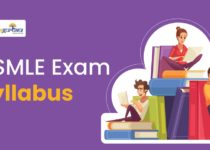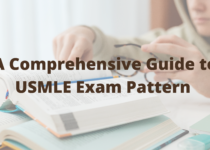USMLE Step 1 Study Strategy

Getting into a medical school is a complex process, and it takes years of diligent studying, a focussed approach, and incalculable hours of perfecting the application process. In short, it requires hard work. The process doesn’t stop after you become a medical student. To obtain your medical license, you will have to go through various exams. The first step or exam is USMLE (the United States Medical Licensing Examination) Step 1 at the end of the second year.
USMLE is an essential exam, and you need passing scores to become a certified practicing physician. It takes you one step closer to your dreams. It is imperative to create a plan on how to study and what are the key topics or areas of attention. Let us explore the six tips on how to study for USMLE Step 1. These tips will help you plan your days, study effectively and efficiently for the exam.
USMLE Step 1 Study Strategy Tips
The USMLE Study strategy tips are listed as follows:
Start Early
The much-needed part of securing good marks or passing marks in USMLE is to start early. Do not wait for the second year to start the preparation for the exam. Students should engage themselves in the first and second years of study in medical school to learn and be proactive. Instead of just studying to clear the exam, focus on understanding the concepts and learn the practical approach of the study.
Making notes can help you recap before your exam and gives you an overview of what you’ve studied in the prior years.
ENROLL FOR eGurukul USMLE Package here
Attempt more questions
During your first year of medical school or preclinical years, attempt as many questions as possible. Study more books, ask for recommendations, enroll yourself in online courses and question banks, study schedules, etc. All these things will help you absorb more material. It might not be possible to go through all the questions during the day, so study for 3-4 days every month and attempt as many questions as you can. Question banks help students learn faster and effectively.
Attempting more questions will increase your speed of solving the questions and help you retain more information. You can also set up a monthly test for yourself to review the topics you have covered in that month. It will keep you updated with the topics and concepts that you have already covered. If you get low scores, you will have time to analyze the situation and prepare for the topics again.
Right resources
Choosing the right resources for the study is crucial. There are various study recommendations, tools, applications, and books to choose from. Most of the students choose a combination of Pathoma, First Aid, and UWorld for USMLE preparation. However, the choice for the right resources should be based on your learning requirement and not on the number of users. Certain methods and tactics might not work for you as others.
Many medical students and physicians recommend studying in groups. Find like-minded people and form a study group. It will help you compete with your peers before giving the final exam. It is also essential not to join groups that follow different learning patterns compared to you. The best advice is to test your knowledge and check for yourself to figure out what works best for you, in terms of study strategy, patterns, recommendations, and learning style.
Scheduling tool
Scheduling your day and tasks keeps you focused on your goal and progress. A scheduling tool will help you keep track of all the progress you have made in a day, week, or month. You can start with a week or four days to get used to the scheduling tool. If it works for you, you can continue. If not, switch to some other method. A proper schedule will push you to show up every day and complete the task. Various applications can automate this process for you to help you save time.
If you are not absorbing knowledge or learning something every day, a schedule won’t matter. It is essential to change the methodology and utilize the time to its maximum for real results.
Take practice exams
Practice exams are necessary for studying productively. Students must complete practice exams before taking the actual test. Practice tests mimic the actual test and are the best way to simulate the actual event. Students can take practice exams online through the National Board of Medical Examiners (NBME) website. It contains the same exam patterns as USMLE tests. However, the scores may be a bit inflated because of external factors, like the comfort of your house.
Therefore after receiving the results of practice exams, students are advised to deduct 10-15 marks. The pressure and nerves are high during an actual test as compared to a dummy test. Deducting these marks will offer a true understanding of where you stand vis a vis the actual test scores.
Mental Health
Exams are vital, but so is your mental health. Many students take the stress before exams and end up performing poorly. Attending and caring for your mental health along with your studies should be a priority. If you are tired or burnt out due to studying for the whole day, it is okay to reach out for help or take a day off from your daily schedule.
While scheduling your daily tasks, you can add breaks or off-days to rest and accumulate your energy for the upcoming day. It will not only help you in rejuvenating but also provide a renewed vigor. Once you have relaxed well, you can study efficiently. Take one step at a time and handle your schedule and situation respectively.
Preparation for any exam is not easy, specifically USMLE Step 1. It takes time, proper planning, scheduling tasks, and consistent practice to get results. In the process, it is okay to feel shaky and have the stress of residency placement. If you have a proper plan in place, passing the USMLE Step 1 is not difficult. It is achievable.
If you follow the steps mentioned attentively, you can meet your exam goals. Have confidence and dogged conviction to achieve. Step 1 is just a part of a postgraduate training position, but it is equally essential for your journey to becoming a resident. Students are also required to perform well in the interviews and demonstrate clinical skills during rotations.
The process of applying and securing a postgraduate training position is overwhelming. But, with the correct planning and techniques, it is achievable. Students can also find various significant lectures, extensive Question Banks, and the relevant latest news in the Egurukul. It supports your need for concept-based learning, guided by skilled teachers and mentors.

